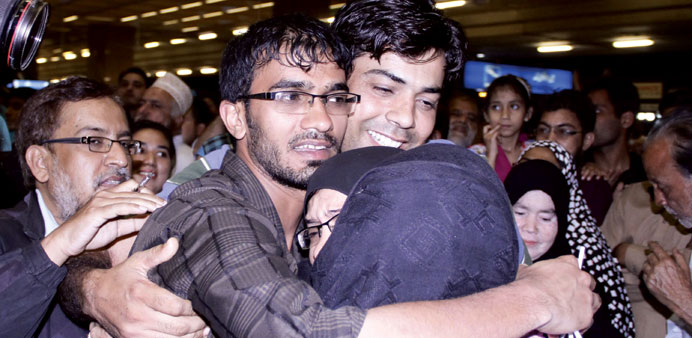Reuters /Islamabad
Pakistan will send troops to Saudi Arabia to join the coalition fighting Yemeni Houthi rebels, a senior government official said yesterday, joining several Gulf states, Sudan, Egypt and Morocco.
Pakistan, a regional ally of Saudi Arabia, would join a Saudi-led military coalition conducting air strikes against Shia Houthi forces.
The air strikes are targeting the rebels’ southward advance on the port city of Aden, the last bastion of Saudi-backed president, Abd-Rabbu Mansour Hadi.
Nuclear-armed Pakistan shares a long border with Iran, considered to be the centre of Shia power, and has a warm relationship with Saudi Arabia, Iran’s main regional rival. An estimated 20% of Pakistanis are Shia.
“We have already pledged full support to Saudi Arabia in its operation against rebels and will join the coalition,” the Pakistani official said.
A Pakistani team, to be led by Defence Minister Khawaja Asif and foreign policy chief Sartaj Aziz, had been due to arrive in Saudi Arabia on Monday but delayed the trip at the request of the Saudis, the official said.
On Monday night, Aziz and Asif met Pakistan’s military chiefs and Prime Minister Nawaz Sharif.
“Pakistan remains firmly committed to supporting the sovereignty and territorial integrity of Saudi Arabia in accordance with the aspirations of the people of Pakistan,” a statement from Sharif’s media office said.
“Pakistan stands committed to playing a meaningful role in arresting the deteriorating situation in the Middle East.
There are already about 750-800 Pakistani servicemen in Saudi Arabia but none are combat troops.
Pakistan has already had small demonstrations both for and against military intervention.
Right-wing religious groups demonstrated last week vowing to defend Saudi Arabia. But some civil society groups and opposition politicians spoke against intervention, on the view that it could further inflame sectarian tensions at home.
Sharif has long enjoyed close relations with the Saudi royal family.
After his second term as prime minister was ended by a military coup in 1999, he was sent into exile in Saudi Arabia.
Saudi Arabia lent $1.5bn to Pakistan last year to help Islamabad shore up foreign exchange reserves. Pakistani officials initially refused to divulge the source of the loan.
On Sunday Pakistan evacuated more than 500 of its citizens from Yemen by jumbo jet and sent a naval frigate to rescue others stranded in the war-torn country, officials said.
Shujaat Azeem, aviation adviser to the prime minister, said the PIA flight carrying 503 passengers from Hodeidah had arrived in Karachi.
Live television footage showed the jubilant passengers being offered rose garlands and bunting of the Pakistani white and green flag as they emerged from the arrivals lounge of Jinnah International Airport.
Many people cried when they hugged each other and relatives of some passengers distributed sweets to those who had gathered to welcome the evacuees.
Passengers said they were happy to be home and thanked the government amid slogans of “Long live Pakistan”, “Long live prime minister” and “Long live PIA.”
Foreign ministry spokeswoman Tasnim Aslam said there were still up to 250 Pakistanis in the port town of Mukalla, which was peaceful, with officials trying to ascertain how many want to be evacuated from nearby Riyan airport.
She said fighting was going on in the southern government stronghold of Aden where up to 200 Pakistanis were stranded as the airport was not accessible but the port was open.
“Our navy ship on its way to Aden. We are also co-ordinating with the Chinese,” Aslam said.
The first batch of Pakistanis was evacuated as Saudi-led air strikes hammered Shia Houthi rebel targets.
Ahmed Assiri, a spokesman for the Saudi-led coalition, confirmed to reporters in Riyadh that coalition forces had “ensured a safe corridor” by suspending operations around Hodeidah airport for a few hours to allow Pakistan “to evacuate its citizens”.
Pakistani Prime Minister Nawaz Sharif was personally monitoring the evacuation and had directed officials to ensure the safe return of every citizen, a spokesman of Sharif’s office said.
A second, smaller plane with a capacity of 230 passengers was also being kept on stand by in Pakistan, PIA spokesman Hanif Rana said.
PIA pilot Khalid Amin said he did not hear any bombing or gunfire at Hodeidah airport.
“The crew flew voluntarily to Yemen despite made aware about the dangers of flying into conflict zone, but everybody wanted to be onboard with national fervour,” Amin told reporters.
Foreign Secretary Aizaz Ahmad Chaudhry had said Saturday around 3,000 Pakistanis lived in Yemen with some 1,000 trying to leave the country.

Pakistani families, evacuated from Yemen, are greeted by relatives on their arrival in Jinnah International Airport in Karachi yesterday.
